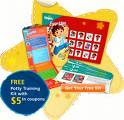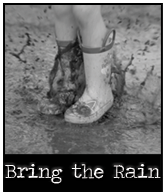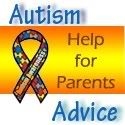---"The quickest way for a parent to get a child's attention is to sit down and look comfortable." ~Lane Olinghouse
 Parents often say that toddlerhood is the most trying time of parenting as they turn their backs on their normal life and begin living the life of chaos, sleep loss, tantrums, unrealistic demands, demanding temperaments and guilt.
Parents often say that toddlerhood is the most trying time of parenting as they turn their backs on their normal life and begin living the life of chaos, sleep loss, tantrums, unrealistic demands, demanding temperaments and guilt. There are certain areas of toddlerhood that are particularly tough and rigorous and if they get out of control, which is often the case, can cause disruption in vital areas such as health, fitness and well being for both parent and child. There is no way to avoid any of these areas and rightly so, as toddlerhood is a time when toddlers have their own thoughts and ideas about things he wants and wants to do, but doesn't yet have the emotions or body structure in place to nourish these needs and wants. What parents can do to ease the road for a more healthy stress free toddler, is to approach these areas ahead of time, gradually working through the process as baby grows into toddlerhood.
It's a huge learning time and toddlers are curious and inquisitive little creatures, which is of course a good thing but can be hard on the nerves of parents requiring double the patience, double the understanding, and the ability to put themselves in the mind of a child.
You can ease the journey through toddlerhood and help yourself and your child by getting a good head start with training and teachings for these areas before your child reaches toddler age. This will also pave the way to a well adjusted sleeper in the preschooler stages. By the time they are at the terrible 2's stage they will be easier to handle, their habits will be easier to handle, and mom and dad will have a much easier time tending to themselves, their relationship, and raising their kids, as apposed to only raising their kids and leaving their personal needs and wants aside. You can have both, you can nurture your needs and your child's needs at the same time.
Parents Homework
The absolute best way for parents to approach the toddlerhood stages on a positive note is to research and understand what goes on in the mind of a toddler, what these stages mean and what you are in for. If you understand what goes on in the mind of a toddler you will be able to understand their behavior and offer them the help they need for positive growth during this time. Being prepared is always a good place to start on any journey. The best book I have ever read with regards to toddlers is, "The Happiest Toddler on the Block." You can find a link to the book on this page on the right hand side. This book offers great parenting tips on how to handle this time frame and helps you to be emotionally and educationally prepared for toddlerhood, which helps you prepare your baby as well.
I cannot tell you the freedoms I have that other parents around me don't have simply because I put certain techniques and procedures into place before my daughter reached toddlerhood. Further on down the page are a few examples of these freedoms.
 Area #1 Toddler Sleep Problems:
Area #1 Toddler Sleep Problems:Train your baby BEFORE toddlerhood to be an independent sleeper
If you are not already aware, toddler sleep problems is when a toddler cannot get to sleep on his own without mom or dad to put him to sleep, who won't comply nicely to going to bed, and who wakes up in the middle of the night regularly needing mom or dad to put him back to sleep.
This means that at bedtime every night the nightmare begins with bedtime tantrums, that can continue further when the parent leaves the room and the child is screaming his head off, calling mom and dad and begging them not to leave the room. Some children will go so far as to pretend they are sick or something is hurting them or say they are scared.
Parents usually spend anywhere from 2-4 hours just trying to get their child to go to sleep. This takes away from the free time a parent should have when their child goes to bed. Not to mention the health and behavior issues for a child that isn't getting the require sleep for his age and health and behavior issues that encompass sleep loss for mom and dad.
Then there is the night waking. It is normal for a child to wake briefly at night but there is no need for them to have to wake you up to put them back to sleep if you have taught them how to fall asleep on their own. If you have done this, they will put themselves back to sleep and this goes together well when it is time for them to sleep without pull -ups and get up to go to the bathroom at night if they need to. Imagine if at that age, they still had to wake you up to put them back to sleep! Let me not forget the health hazards involved with toddlers sleep problems and preschoolers who do not get the required amount of sleep daily.
Many parents find out the hard way that their toddler or preschoolers problematic behavior is likely due to their poor sleep habits and lack of sleep. Some of these areas include, poor eating, being less active, irritability and crankiness, and not functioning to full capacity at school, are to name a few. Health Hazards Stir from Toddler Sleep Problems
With so many things to remember every day, all the time, we all know how easy it is to forget even the important things. If someone has forgotten to prepare the house with night lights, or forgotten to close the gate on the stairs, your toddler's night waking habit becomes a danger for him, as he could trip on something left on the floor by a sibling or fall down the stairs.
Parents lose precious sleep, toddler loses precious sleep and this bedtime nightmare will go on for years if you don't get it under control as soon as possible.
A preschooler who cannot sleep on his own is a road you don't want to travel and a poor sleeper at preschool age will not adapt well in school and will have a slower brain function to name a few. By beginning the process early you will enjoy the stages of toddlerhood more and avoid the depth of bedtime tantrums, sleep loss and health issues that come with toddler sleep problems.
It is imperative that you begin your baby on a sleep routine once he no longer needs night feedings.
Babies, toddlers and children need routines. It helps them feel cared for and loved and tells them what time of day it is until they are old enough to tell time. Although they put up a fuss this is only because the tasks involved in the routine sometimes don't suit them at that moment and they have not yet learned how to handle disappointment, especially when mom and dad are there to fix everything and make the day bright and exciting. For them, it is like suddenly all the fun as to come to an end and they don't understand why.
Bind yourself and your child to a bedtime routine on a nightly basis. Consistency with the routine is a key component to it's success.
Sample Sleep Routine
- Chose a suitable time for your child to go to bed every night. This timing will change as your baby grows into toddler hood. Begin the winding down process 30 minutes before baby bedtime.
- Put on PJ's, dim lights, give a bath or even better is a baby massage. Set a relaxed mood in the the room of the house you will be in with your baby. This lets your baby know that it is approaching bedtime without you having to say anything. He will grow into toddlerhood recognizing this sign.
- Prepare his room for sleep mode by using soft lighting such as a night light, playing orchestra music or baby lights. Help Baby Sleep at Night - 4 Little Secrets
- Avoid starting bad habits at bedtime. Do not get your child get addicted to soothing measures that help baby to sleep like being rocked or fed to sleep at night. This will start a bad habit that you will only have to break later on and is one of the main causes for bedtime struggles. At a certain age it is unhealthy for your child to eat just before bedtime so when this time comes around your child will not be able to get to sleep on his own and will require you to feed him in order to get him to sleep, thus begins the bed time struggles. The same goes for rocking your baby to sleep every night.
This doesn't mean never rock your baby, or never use rocking as a measure to help baby to sleep. It simply means don't make it a habit. There are plenty of other times during the day when you can rock your baby, such as when reading a story, or just for cuddle time.
What your baby should get addicted to is his bedtime routine that let's him know it's time to sleep and he becomes prepared instead of suddenly being pulled from his fun time to go to bed. A bedtime routine will also become a bonding time for parent and child, when it runs smoothly and becomes a pleasure instead of a nightmare.
- Choose a bedtime activity he can rely on to help baby to sleep. Decide what your last activity will be with your baby before he goes to his crib for the night. It should be an activity based on a calming, relaxed mode of interaction, but doesn't put him to sleep in your arms.
- Rocking and singing bedtime songs.
- Rocking while reading a story.
- Reading a story while your baby is in his crib.
- Singing bedtime songs to him while in his crib.
- Holding him in your arms and walking around with him patting his back and singing to him. Which ever you choose, try and keep it consistent. When your baby is older you can change the activity for more variety at bedtime. Your aim is not to put him to sleep while doing this so keep it short but sweet. Between 5-10 minutes tops. The point of this is to relax and spend time with him. Take your baby to his crib.
- Take your baby to his cozy, sleep mode room and put him down in his crib and say goodnight. You want to put him in his crib before he is asleep to get him used to falling asleep in his own bed. You want to also leave the room while he is not yet completely asleep. This is to get him used to falling asleep without you in his room.
Dealing with crying.
There are several ways to deal with the crying that will take place at some point when you put him in his bed and leave the room. You will need to do some research into the different solutions available, and many of them you must assess according to the personality of your child as well as the parenting style you have chosen. Start your research early so you know exactly how you want to tackle this issue.
 Mom and Dads nightmare is about to come to an end! Help baby sleep at night...all night....every night
Mom and Dads nightmare is about to come to an end! Help baby sleep at night...all night....every nightRemember that as your baby grows into an older toddler and your toddler grows into a preschooler, the routine needs to be modified to suit their age and personality. So be sure to do the necessary research to make the necessary changes that are age appropriate.
Here are some of the ways having an independently sleeping toddler has positively effected my role as a parent, a wife, a professional, and a friend.
I can go out with my husband on any night of the week and we are not called back by our nanny. We return home, to a quiet house and our daughter is asleep leaving us with the rest of the evening free. Intimacy is more relaxed as apposed to keeping one eye on the door.
It is rarely that our daughter will wake up in the night and disturb us. When she does, we know she is either not well or simply having an off night and truly needs us.
When she was younger and napping, naptime was a breeze, leaving me to get many tasks out of the way to free up my time in the evenings. I also used to watch my favorite show on TV or sometimes read a book while she was napping.
I have time to be sociable with friends in the evening. I can have people over before her bedtime, take her to bed, read her story and leave the room without a fuss from her. Instead it's a lovely goodnight with lots of kisses and cuddles.
I am more alive and vibrant with energy and patience for my family and friends. I have more time to devote to my relationship, my hobbies and myself.
My daughter wakes up nicely in the morning and is in a good mood and refreshed for school.
I am not pulling my hair out in the toddler stage as much as most of
the mothers I know and this makes me feel good about myself as a mother.
Bedtime at my house is a calm, bonding, relaxed time with my daughter.
If there is an evening event and we get home late, she is still able to go to bed
without a fuss as apposed to many toddlers that will beg to stay up and continue to play.
I go to bed at a decent hour and a get a good nights rest.
It is my hope that ALL parents enjoy the small freedoms they can have even when going through the toddlerhood years. If you have an independently sleeping toddler, you can gain more time for yourself and your needs. Not to mention a better behaved, more healthy, bright eyed toddler as apposed to a cranky, clingy, over tired, always sick, temper tantrum toddler with sleep problems.
Baby Sleep Help
 The Baby Sleep Solution
The Baby Sleep Solution Free Bedtime Delights
Free Bedtime Delights
 #2: Teach Independent Play
#2: Teach Independent Play Introduce independent play techniques early in toddlerhood to help your preschooler be more emotionally prepared for independence.
Let's set the mood for a preschooler who IS NOT able to entertain himself through independent play. He will will be clingy, naggy and desperate for attention when you are trying to do something or gets annoyed and jealous when doing something other then with him (talking on the phone, having a conversation, doing a task). To some degree this stage of clingy is normal - but instead of growing out of it naturally, it can overstay it's welcome, when a toddler doesn't learn to get on by himself in small ways, such as playing.
Parents find themselves desperate for a few moments to themselves or just to do a simple task, and plop their toddler in front of the TV - then spend the rest of the day feeling guilty for it. Not to mention you will find that you are never able to even finish a single thought process because your toddler is right there to remind you that you should not be thinking of anything but him! Does this already sound familiar? Imagine if you are STILL in the same situation when your toddler grows to a preschooler!
A toddler able to play on his own and entertain himself holds a valuable skill toward independence, creativity and imagination. The value extends to parents when they are able to function in a somewhat smooth, somewhat uninterrupted mode. Thus, saving valuable time and experiencing less stress and time constraints. This means you could finish your day of parenting tasks much earlier and much faster, leaving time for other things, yourself, your spouse, or fun times with your kids.
A toddler and preschooler who is emotionally prepared for independence (appropriate for his age of course) will be of considerable assistance to mom around the house, and will be happy to assist in little tasks to help. He will be better equipped emotionally to understand and handle when you need to step out of the room or out of the house to tend to other matters. It is also a huge value toward their behavior and settling in at school or when it is necessary to make changes in their life or schedule.
Here is how start introducing the idea of independent play to your baby. You will need to maneuver your teachings as he progresses into and through toddlerhood and the process of learning to play solo. I have selected some very good places for you to further your travels once you put the initial steps in place.
Teaching Independent Play
The Playroom
Select a suitable room or area where your baby can play on his own. Ensure this area is child safety proof. Gate the room off. It is preferable to have an area where your child can see you, especially in the beginning of the process around 13 months. Otherwise, be sure to use the baby monitor.
Toy Rotation
Sort toys in plastic bins or baskets and rotate them so baby doesn't get bored of the same old toys. This also helps to keep your child's enthusiasm up for the toys he has, and helps to avoid him constantly asking for new ones. Toys should be educational but fun and can be played with without adult supervision and age appropriate.
Suggested Toys for Independent Play
Be sure the toys you choose are age appropriate and safe.
- wooden puzzles
- board books
- dolls
- play sets like Fisher Price Little People
- washable, toxin-free crayons and coloring books
- wooden or plastic building blocks
- hand and finger puppets
- play dishes and food
- Toxic Free Play dough (homemade play dough is a great activity for toddlers. They love to help in the kitchen) Non-Toxic Homemade Play dough
Crank Up the Tunes - Toddler Style
Music is a helpful tool when raising kids. It helps keep them company and not feel so alone and becomes an extra addition to their toys when they start to sing the words and do a little dance. Be sure to place the music player on a high shelf. Select a few Cd's for variety. Choosing songs that are familiar to them and they associate with their favorite characters is helpful.
The Playroom Introduction
Before you begin the procedure of teaching independent play, it is important to introduce the new playroom or area to your baby. Sit with your child and show him all the toys and things he can do in his new play area. Naming the playroom can also be helpful, creative and adds imagination to the fun. For example: "Anna's Magic Castle" or "Mother Goose's Play Room." Although you are sitting with your child, let him play by himself as much as possible.
The Procedure
1. The next day, start off by doing the same as above but this time, turn on the baby monitor and the CD player and leave the room for a few minutes. Wait about 1-2 minutes then return to the room. This lets your child know you are near by and have not left him. It also lets them know that when you step out you will return. During this time your child may fuss. It is important for you to remember that you are helping your toddler adjust to this procedure for a specific outcome in the end, which is independence so don't stress out if he fusses. It's all part of the process.
2. Gradually increase the time you leave your child in the room to play until he is able to play on his own for longer periods of time. Even when your child is able to sit and play on his own for 30 minutes, it is important that you always check on him, show interest in what he has been doing on his own, and congratulate and thank him for being so good cooperative.
3. After each independent play time, praise him for the great job he did in his playroom and reward him by spending some quality time with him, one on one, without any distractions.
Helpful Tip 1: If you find your toddler keeps screaming, then stay out of the room but talk to him from where you are to let him know you are close by. Then be quiet for a few seconds, then shout out a few brief words to him again and so on until it is time for you to return to his playroom.
Helpful Tip 2: Another good tip is do not go running into the room just because you hear him fuss - walk into the room calmly, spend a little time pumping up his ego, then leave the room again. Each child has his own limits as to how long they can entertain themselves and play solo.
You will learn your child's limit as you progress through the procedure. When he plays solo and that limit is up, you must respect that and at that point spend sometime with you toddler one on one without any distractions - just you and him.
What Not to Do
- Do not expect miracles over night. Every child is different and some will take longer then others to grasp the idea.
- Do not show fear, annoyance, anger or frustration when he fusses. Smile, as though it is no big deal and carry on with what you have to do. Use pleasant facial expressions and a loving voice as a soothing technique.
- Do not use food to keep him quiet. This is the start of a very bad habit that can later have severe effects. You don't want your toddler to learn to soothe himself with food.
- Do not totally ignore him thinking it will help speed up the process or make him tougher faster. Your toddler needs to know that you are there. If he thinks you are not, this will cause mistrust and he will see his playroom time as a time completely without you which is too much for him to handle at this age. He will also remember it as a time when he was afraid and will not take well to the idea of the playroom.
For the next steps and alternative measures.
 About Kids Health: Teaching Independent Play
About Kids Health: Teaching Independent Play Parents.Com: Developmental Behavior
Parents.Com: Developmental Behavior Examiner.Com: Easy Independent Play Activities
Examiner.Com: Easy Independent Play Activities
 #3 Healthy Eating Habits
#3 Healthy Eating HabitsTeach your child to eat healthy from his first bite of solid food.
Now here is an area you hear lots about. Children and healthy eating, good food choices, and an education in eating healthy for a healthier, stronger platform as they grow into adulthood and there after. I will be the first one to admit to you that this area of toddlerhood is to me, tougher then any other stage.
I have a picky eater on my hands which always complicates things. How is it that my picky eater eats a variety of foods including veggies raw and cooked with her meals? How is it that my picky eater will bring home a piece of candy instead of eating it the second it lands in her hands? How is it that my picky eater prefers dark chocolate to milk chocolate, honey instead of jelly, juice instead of a soft drink, and cucumbers instead of chips?
Toddlers will fight you for everything they want, and battle with you for everything they cannot have. This is why, when it comes to meals and snacks it is important to gain control as early as possible and put the training in action to prepare for an easier, smoother ride in toddlerhood. If you don't want to find yourself fighting with your toddler at every meal, or battling with him to finish his food, or become one of those parents who's spends the entire day in the kitchen trying to put something together their toddler will eat, then prepare early so your toddler will be more easy going with your meal selections, eat healthy foods he likes, and is able to get through meals stress free with a smile.
Here are the areas parents need to keep well in tact in order to ensure their baby grows into the toddler stage as a healthy, hassle free eater.
- From the day you introduce solid foods introduce a variety of fruits and vegetables in order to obtain the variety of nutrients they offer, and to subject your baby to as many different flavors to grow with.
- Use fresh fruit and vegetables, pureed at home as apposed to jar and bottled foods. Prepare ahead of time and freeze for faster meal preparations.
- Keep a diary of foods liked and disliked. Wait 2-3 weeks and introduce the disliked food again.
- Do not force your baby to eat a food he does not like. If you do this you will create a negative attitude toward meal times. If you decide to try and mix a food he doesn't like with one he does like, if he doesn't eat it then respect his dislike for it an don't try and trick him again. Otherwise, you will find he will no longer eat the food he does like because he thinks the food he dislikes is in it.
- Use the versatility of fruits and vegetables to your advantage. Raw, steamed, roasted, grilled or boiled. Mashed, chopped crushed, squeezed or cut into funny shapes. Bite size pieces should be age appropriate in size. Slip vegetables into soups and sauces or grind them into meat or chicken balls. With fruits you can make smoothies, chopped into yogurts or cereals or used in ice lollies.
- Do not give your baby sugary snacks or drinks for as long as possible.
- When you do introduce desserts make them from scratch at home. Making desserts at home will give you control over the amount and quality of the ingredients used. You will also be able to add health benefits to your child's sugary snacks by adding fruits and vegetables of your choice. Below you will learn how to do this without taking away from the fun and great taste of the goodies.
- Build your baby up to be able to eat and enjoy raw fruits and vegetables by the time he is a toddler. Raw foods offer high amounts of enzymes to aid in digestion, plenty of fiber and high quality nutrients to increase energy and stamina and in detoxification mechanisms that get rid of toxins in the body.
- Use sugar alternatives as much as possible. Raisins, dates, honey, fresh fruit, apple sauce, fruit juice, etc
- Give healthy snacks and desserts that revolve around fresh or dried fruits instead of cakes, biscuits and cookies.
- Avoid sugary and fizzy drinks at all costs. These are addicting and once your child has it he will find it difficult to drink fruits juices and water, and will always insist on a fizzy sugary drink.
- Avoid starting bad habits that will cause you and your baby problems later on, and will only be habits you will have to break in order to keep your toddler healthy.
- Check food labels for foods high in sugar and learn the different names for sugar that are used on food labels. Ingredients with the highest content will be listed first on the label.
- Do not use sugar as a reward.
- Be sure your children are getting the required amount of vitamins and minerals required daily from their food intake and are receiving the appropriate portions for their age. Wholesome Baby Food
- Keep meals fun and light. Do not show anguish or stress when you prepare a meal for your baby and he doesn't eat it. It is frustrating but don't let it show.
- Avoid fast foods at all costs. Introducing these foods too early will cause you and your baby problems later on. Not to mention these foods are extremely unhealthy and high in fat. There are rarely any benefit to them at all.
- It is important that the family eats meals together. A recent 10 year study showed that children from families who eat meals together bring home A's and B's, feel more confident that mom and dad are proud of them, and have better eating habits all around. In order for this to be the case you need to have at least one meal together a day, on a regular basis
- Parents should lead by example when it comes to healthy eating. Let your baby see you eating your veggies and fruits. As he grows, and sees mom and dad eating certain foods, he is more likely to try those foods at some point.
- Give your baby the time he needs to eat. Adults eat too fast, which is why parents often find it frustrating to wait so long for their baby to finish his meals. Adults are also pressured with the many tasks that await them after dinner, so they tend to rush their meals. Give your baby the time he needs to digest properly. It would definitely do us some good to learn from our kids and slow our pace of eating down. You might want to try it yourself to assist in having a stronger, more healthy digestive system.
- Make eating and snacks fun by using cut out shapes, letters, and designs for some of your baby's meals and snacks.
- Give your baby feedback and reward his progress.
- Grow these basics with your baby into toddlerhood. Remember that as they grow into toddlerhood, there will be a difference in the variety of food for them and ways to introduce side dishes.
- When your baby gets a little older, like 2 years, let them help you in the kitchen while you are preparing meals and snacks. Give them small, safe, easy tasks they can do. This helps get them interested in food, and makes feel good about themselves that they have helped out in the kitchen. You will find that it is a huge assistant to a healthy eater and less of a fussy eater. As your toddler grows older increase his tasks so he can feel more grown up by advancing his tasks in the kitchen.
Go Homemade
One of the ways to give your kids some goodies with a health kick is to sneak the good stuff in the ingredients when you bake. If you do this early, and avoid outside treats and goodies, your baby will grow used to your homemade goodies as apposed to the sugary unhealthy junk they would get from outside source.
You still need to be careful and not over do it because these are still sugary sweets, but at least they hold some value and kids can still enjoy their goodies, as they should, provided you keep consumption to a minimum on a daily basis, and ensure your child is getting the exercise required for their age.
When your baby reaches an age where you begin to give foods such as muffins, cookies, and pancakes, is much more healthy and cost effective to bake them from scratch at home. Another plus point to this is that you can make these unhealthy snacks a bit more healthy by adding a pureed vegetable or fruit to the ingredients.
Goodies with a HEALTHY punch
Brownies
You can add pureed spinach to brownies. The trick is to let the brownies cool 100% so that the taste of the spinach is gone. Add 1/2 cup of pureed spinach and 1/2 cup of pureed carrots to your brownie ingredients. These can be frozen for future use.
 Pureed vegetables and fruit
Pureed vegetables and fruit
Can be prepare ahead of time, in batches. Make 1/2 cup batches, put them in freezer bags and freeze them until you need to use them. Steam each vegetable for about 10 minutes (do not over cook or you lose the vitamin value). Add a little water if the puree is to thick.
 Banana Bread
Banana Bread
Add 1/2 cup pureed cauliflower to the ingredients. Scrambled Eggs - Add 2 TBLS cauliflower puree or yellow squash, or butternut squash to 1 egg. Do the same for omlette style egg.
 Pancakes, french toast, waffles
Pancakes, french toast, waffles
Add 1/2 cup pureed cauliflower, or carrot, or butternut squash to the ingredients and cook normally. You can also add bananas to the pancakes and dark chocolate chips for an antioxidant kick. These can also be frozen. Always use dark chocolate for baking for it's antioxidant properties.
 Ketchup
Ketchup
Add carrot puree.
This mixture will keep for up to 3 days in the fridge.
 If you do find yourself in a position where you have to use a can food for dinner, add a pureed vegetable to the sauce the last few seconds of cooking time.
If you do find yourself in a position where you have to use a can food for dinner, add a pureed vegetable to the sauce the last few seconds of cooking time.
 Chocolate Cake or cupcakes.
Chocolate Cake or cupcakes.
For parties or special events or just to have at home, make chocolate cupcakes using pureed beets (1/2 cup), you can also add pureed beets to the frosting. For white cupcakes use cauliflower puree.
You can add pureed spinach to brownies. The trick is to let the brownies cool 100% so that the taste of the spinach is gone. Add 1/2 cup of pureed spinach and 1/2 cup of pureed carrots to your brownie ingredients. These can be frozen for future use.
 Pureed vegetables and fruit
Pureed vegetables and fruitCan be prepare ahead of time, in batches. Make 1/2 cup batches, put them in freezer bags and freeze them until you need to use them. Steam each vegetable for about 10 minutes (do not over cook or you lose the vitamin value). Add a little water if the puree is to thick.
 Banana Bread
Banana BreadAdd 1/2 cup pureed cauliflower to the ingredients. Scrambled Eggs - Add 2 TBLS cauliflower puree or yellow squash, or butternut squash to 1 egg. Do the same for omlette style egg.
 Pancakes, french toast, waffles
Pancakes, french toast, wafflesAdd 1/2 cup pureed cauliflower, or carrot, or butternut squash to the ingredients and cook normally. You can also add bananas to the pancakes and dark chocolate chips for an antioxidant kick. These can also be frozen. Always use dark chocolate for baking for it's antioxidant properties.
 Ketchup
KetchupAdd carrot puree.
This mixture will keep for up to 3 days in the fridge.
 If you do find yourself in a position where you have to use a can food for dinner, add a pureed vegetable to the sauce the last few seconds of cooking time.
If you do find yourself in a position where you have to use a can food for dinner, add a pureed vegetable to the sauce the last few seconds of cooking time. Chocolate Cake or cupcakes.
Chocolate Cake or cupcakes.For parties or special events or just to have at home, make chocolate cupcakes using pureed beets (1/2 cup), you can also add pureed beets to the frosting. For white cupcakes use cauliflower puree.
Use this same idea for breakfast, lunch and dinner meals, adding a puree to the meal. However, you should always have vegetables at the table so your baby can see you eating them and will soon be interested in trying them himself. Cooking with vegetable puree is just a way to get those required nutrients in your baby but they should not replace vegetables being seen and eaten at the table for meals and snacks. Continuously putting those disliked veggies at the table and seeing mom and dad eat them, will help toddler gain interest in them over a period of time.
Healthy eating is an area that requires constant attention and follow up. Even when you see your baby, toddler or preschooler is doing well with his healthy eating, be careful that you don't just assume all is well forever. Parents need to follow up, keep their eyes peeled and continue introducing new foods to their kids.
Healthy eating needs to be managed and kept an eye on for several reasons:
1. Healthy eating is an on going process and kids need to continuously be educated on the subject .
2. Pier pressure, poor eating habits of other children, and even other parents and teachers, can over indulge in sweets, and junk food and your kids will need you help to ensure they stay on the right track, especially after all your and your child's hard work.
These tips, when utilized regularly, will help you grow your baby into a problem free eater as he grows into and through toddlerhood. You will have a much easier time with your toddler if he is already used to certain eating habits and used to the rules that mom and dad set into place. In the event that you could have a picky eater on your hands, these tips will help to illuminate many picky eater headaches.
1. Healthy eating is an on going process and kids need to continuously be educated on the subject .
2. Pier pressure, poor eating habits of other children, and even other parents and teachers, can over indulge in sweets, and junk food and your kids will need you help to ensure they stay on the right track, especially after all your and your child's hard work.
These tips, when utilized regularly, will help you grow your baby into a problem free eater as he grows into and through toddlerhood. You will have a much easier time with your toddler if he is already used to certain eating habits and used to the rules that mom and dad set into place. In the event that you could have a picky eater on your hands, these tips will help to illuminate many picky eater headaches.
How to puree fruits and vegetables
1. Steam the veg or fruit for 10 -15 min's max (no longer or you will remove the vitamins and nutrients, this is why steaming is a preferred method for vegetable cooking)
2. Be sure to leave the skin on the vegetables that have healthy value - i.e summer squash and zucchini.
3. Put cooked vegetable in blender and blend until smooth.
4. Fruits can be simmered in a little water for about 5-10 minutes (be careful not to overcook). Retain the water to puree in the blender with the fruit.
5. Puree fruit and it's water from boiling in a blender.
You can freeze portions in freezer baggies to use when you need them. Most recipes will use 1/2 cup portions.

 #4: Goodbye and Separations
#4: Goodbye and SeparationsTeach them to say "Goodbye" with a smile.
This is an area that mom, dad and baby have to work on together. It is also an area that is difficult for parents and is often the cause for couples not enjoying any time out together. A toddler that has problems saying goodbye when mom and dad have to go out or leave for a while is a traumatic experience and can take a long time to get under control. This stage is common and is referred to as separation anxiety.
Can you imagine that there are parents that have settled on the fact that they simply won't go out together until their child can handle them leaving? It is true to a degree that a child grows out of separation anxiety, however, it takes time and doesn't always leave you with a cooperative toddler when it comes time for him to say goodbye to you. He will be so used to running the show of whether you can go out or not, he isn't going to like it when you leave against his wishes.
If leaving anxiety is not dealt with it can lead into a whole other bowl of problems, and parents find themselves separately going out or always staying at home. Not to mention there are plenty of other times when you do have to leave your toddler. At school, at a friends house for babysitting, activities, etc.
Parents grow severely frustrated, anxious, and feel their life together lacks excitement and fun because they are not able to make decisions toward their needs but always the needs of their toddler. Your toddler should not be allowed to control your life to this degree. You are the boss, and as long as you are a good, understanding, patient boss, there should be a reward for you when it comes time for you to do something for yourself or your relationship with your spouse. Not to mention all the things you have to do, and need to do, and could do a lot faster if you aren't always towing a toddler everywhere because you aren't able to handle leaving him when he is screaming for you not to go.
Start early and help your baby pass through the separation anxiety stage before toddlerhood. It is much easier to handle a baby in the separation anxiety stage than it is a toddler and it is also easier for baby at this age then it will be when he is a toddler. Both parents need to have the same approach and need to be consistent, strong, diligent and patient.
Here's how you go about preparing, and working toward an easy, stress free separation time with your baby, preparing him for happy toddler goodbyes.
Here's how you go about preparing, and working toward an easy, stress free separation time with your baby, preparing him for happy toddler goodbyes.
Babysitter / Caretaker
Finding a babysitter you can trust is at the top of the priority list when it comes to leaving your baby when you need to go out. It is extremely common for parents to use nanny cams in order to gauge what is going on in the house when they are not there. Once you hire someone, there are other issues that need to be addressed with your babysitter to ensure that she does things just the way you want and need. You don't want your new babysitter using someone else's ways to care for your baby. Aside from the obvious things your babysitter needs to know, here are some other areas to address before leaving your sitter responsible for your baby.
Finding a babysitter you can trust is at the top of the priority list when it comes to leaving your baby when you need to go out. It is extremely common for parents to use nanny cams in order to gauge what is going on in the house when they are not there. Once you hire someone, there are other issues that need to be addressed with your babysitter to ensure that she does things just the way you want and need. You don't want your new babysitter using someone else's ways to care for your baby. Aside from the obvious things your babysitter needs to know, here are some other areas to address before leaving your sitter responsible for your baby.
- It is very important that you discuss any necessary details with your babysitter, including how to handle your baby when your leaving and after you are gone, during the time your baby is unhappy about your leaving. Consistency is very important and so is support from the babysitter.
- Always make sure your sitter knows your baby's favorite toys, especially the one he uses for comfort in times of fear or insecurities.
- A friendly, patient, not lazy, and preferably experienced sitter are some of the qualities you should be looking for in a sitter or caretaker for your baby. Temperament is also a very important quality for a sitter when caring for young children. Many people do not have the temperament to handle young children but do babysitting jobs anyway, and simply allow the child to sit on his own and scream until they fall asleep. This is one of the reasons nanny cams are high on the list of purchases when it comes to caretakers.
- Let your sitter know that you are working with your baby on separation anxiety and that there will be very specific things she must adhere to when you leave.
- Make sure your sitter is aware of any special things she can do to help the situation for your baby to find comfort as soon as possible after you leave.
- Make sure your babysitter does not use food as a replacement for you. This will start very bad eating habits that can turn into obesity problems. Many sitters will give sweets to get the baby to stop crying, or feed him continuously to keep occupied, as apposed to playing with the child.
The Process / Do' and Don'ts
A baby can show signs of separation anxiety from as early as 7 months. The peak age however, when it really comes into play is between 12-18 months. It is during this time that you need to have your routine and system already worked in so that this time frame is as manageable as possible.
At this age separation anxiety can occur at anytime baby is separated from a parent. It is preferable, if possible, to leave your baby with someone that is familiar to them. However, that option is not always available for many people and they have to find a sitter or caretaker.
Hopefully you can find a suitable one and one that can continue to do the job for a while, allowing your baby to become comfortable and secure in your absence.
A baby can show signs of separation anxiety from as early as 7 months. The peak age however, when it really comes into play is between 12-18 months. It is during this time that you need to have your routine and system already worked in so that this time frame is as manageable as possible.
At this age separation anxiety can occur at anytime baby is separated from a parent. It is preferable, if possible, to leave your baby with someone that is familiar to them. However, that option is not always available for many people and they have to find a sitter or caretaker.
Hopefully you can find a suitable one and one that can continue to do the job for a while, allowing your baby to become comfortable and secure in your absence.
- Have your sitter come early for the first few times you use her. Spend some time with her and your baby together so that baby can see you trust her and she's a friend. Do some play activities to break the ice between baby and sitter. This allows your baby to become comfortable with the sitter, while in a secure state because you are still around.
- Your sitter should be prepared to help comfort your baby once you leave and preoccupy him immediately by playing with him turning his attention away from your being gone.
- No matter what, always say goodbye to your baby. Even if he is crying, even if he is busy playing, you must say goodbye. Always tell your baby you will be back soon. Do not: Sneak out while your baby is busy or not aware. This will cause him to panic the second he finds you gone and leaves him with a strong feeling you have disappeared and not coming back. Avoid this at all costs.
- Keep your goodbye simple and to a minimum. A drawn out goodbye is just harder on everyone, it also shows your baby that you yourself are insecure about leaving. Be confident about your leaving. Do not: Do not let your baby see or feel that you are insecure or guilty about leaving him. Although it is a very natural feeling for mom and dad to have, keep it secret from baby.
- Avoid repeatedly returning to the house or daycare to say goodbye over and over. As hard as this is to avoid, remember that this makes it harder for your baby. Do what is best for him even if you have to sweat through it.
- Have a goodbye routine. A big hug and kiss and special quote when you leave. Or kissing goodbye all baby's favorite toys a the same time you kiss baby goodbye.
- Use your baby's favorite toy(s) to give him security when you are gone. Give it to him each time you leave.
- Invest in a few books to read to your baby about saying goodbye to mom and dad.
- Use returning games when you get home. Peek-a-boo, where's the baby, or looking for objects are the most widely used returning games, but only you can assess your baby and will know if there is another type interaction game that he would enjoy more. Always play a returning game with your baby when you get home or pick him up from somewhere.
- Teach your baby the meaning of "hello" as early as possible. Play a game with him where you come into the room and say hello and leave the room and say bye bye. Each time leave the room a little longer, even if he cries, keep working on it. It should be a game and you should remain smiling and happy when you say hello and bye bye.
Easing separation anxiety in toddlers and preschooler is much more difficult. Start the process early to help goodbyes and separations be more manageable and enjoyable, and alleviate parental and relationship stress.
 #5: Sharing
#5: SharingHelp baby learn to share early, to induce creativity, action, management, and social skills, before toddlerhood.
Aside from the fact that it is nice to share, children need to learn to share for other reasons. These other factors highly impact their behavior as adults and teaching this necessity early on offers an added benefit of early friendships, better behavior in social situations, and an easier time for mom and dad when they don't have to sit glued to their kids when in a social situation, or stress about their child creating havoc because they always fiercely want what another child has.
A child sharing demonstrates the nature of kindness, and at the same time sets a good example for his peers. Young children don't usually want what they already have as much as they want what is out of reach or what is in the hand of another child nearby. Suddenly, the ticker goes off and even if there are two of the same thing, a child will still insist on the one held by the other child. This is a powerful emotion and most times sends a child into tantrums, with no reasoning in sight.
Another trait from birth is the belief that everything is there's. The "mine" Syndrome is a built in trait and making them share everything all the time will send conflicting messages to a young child. Young children need to learn from as early an age as possible the trait of sharing, but also learn the value of ownership.
Parents need to channel these forces toward a positive-proud nature teaching their child to have a a high regard for another's feelings. Here is how you can help your baby learn to share early on.
- Everyone in the family gets used to asking each other permission to use their things. Also ask your baby's permission to use something of his. This creates a world around your child where he grows up hearing and seeing the people in his family having respect for each others things and feelings. If mom and dad are asking permission baby sees this as a normal procedure and will find it much more familiar as he approaches toddlerhood. This also helps detour such a strong "mine" syndrome as baby grows, enabling him to handle the situation better and faster when faced with wanting what another child has.
- If someone in the family needs to say, "no" to sharing, he should offer an alternative, such as, "you can play with these other toys." or, "not right now but later you can."
- Teach your child to take care of his toys and belongings, and to do the same when using something that is not his. Make an example of this by letting your child observe the way you take care of your things by putting them away, cleaning them, or keeping them in cases. Parents can also help their child learn to take care of his things by teaching him to turn his toys off when finished playing with them, and by putting his toys away (as best he can) when he is finished or before bedtime.
- Share your own things with your baby. If you are eating something offer a piece to your baby (provided it is safe and healthy for him to eat). When you do share use the world "share" to get him familiar with the word and the meaning of the word through your actions.
- If you see your baby show an object to another person, it is a step in the direction of sharing. Even if he doesn't let go of the object. This action should be noticed and complimented. "How sweet of you for showing your toy to cousin Jack, that is so nice of you!"
- When you do see your baby share give him high praise and let him know that you are so proud of him.
- If you baby or toddler chooses not to share do not scold or punish him, especially at this age. You can show disappointment but that is it. Don't make a big deal about it, or you are likely to create a negative around sharing and at the same time create your own personal parent and child battleground with regards to sharing.
- Be compassionate when it comes time for your baby to share (especially in toddlerhood). When they shows signs of not wanting to share, let them know you understand it is hard but it is a nice thing do. Remind them that you always share with them (as above, you should be leading by example).
- Do not force your child to share. This sends the wrong message which is that another persons needs are more important than his. Encourage him to share and when the opportunity arises remind him it is nice to share.
- When your baby is approaching toddlerhood, and has friends for a playgroup. Remind him that he needs to share his toys. Allow him to put special toys away that he doesn't have to share.
- Make sure your baby has plenty of social time with other children his age. This will assist in social development and allow him to see actions and behavior of other kids. It will also help him learn to share and handle different behaviors from kids his own age.
It is important that parents encourage their baby to share from as early an age as possible, so that when the tougher teachings and learning's come into the picture at toddler age, the road is a little less bumpy to parents and toddler, simply because the concept will not be a new one to your toddler, but one in which it will be time for him to take the next step of physically sharing with his peers.
Learning to share doesn't happen overnight, and requires that parents keep regular teachings in place and maneuver those teachings as their baby grows into toddlerhood. Once your baby is about 6 months from toddlerhood, there will be specific age appropriate ways to further this teaching process in toddlerhood.
 #6: Teach Responsibility
#6: Teach ResponsibilityTeach responsibility early and help your baby get a head start with helping others, taking care of himself and helping out as part of the family.
Aside from the formal methods, children learn by seeing, doing, imitating, and hearing. If your baby observes you putting things away when you finish, and you talk to him about what you are doing, you can expect that he will soon imitate your behavior by throwing his toys into the toy box, or by picking up another toy from elsewhere and throwing it into a box.
The good news with this area is that it is easy to get the ball rolling because children love to help out. When they are young, they get very excited at the idea of doing grown up things and you will find them more than willing to take on a task to help out. Of course, as they get older this changes and they become reluctant and unwilling to lend a hand or be helpful to others around them. But if you teach this area early on, you will find that your toddler will be more willing to help, less likely to have a tantrum when asked to do something, and as an older child he will carry out his chores and responsibilities with less procrastination and with more diligence.
One of the best ways to teach responsibility from a young age is to have your baby help out with chores at home. Make him mommy's little helper and involve him when you can with helping you out and at the same time taking care of his own things. More importantly you want your child to grow up to be a productive adult and that training needs to start from childhood.
It is very important that you keep all tasks and chores suitable for your child's age. As baby grows into an older toddler than into a preschooler you will need to upgrade the chores and tasks to suit his intelligence and capabilities. Always make sure the chores or tasks are safe for your child and do not pose a risk to injury or worse.
- If you have older kids make sure they are being taught responsibility and that your baby grows up watching how everyone at home helps out. This arrangement will take hold when your baby gets a little older and can recognize that everyone at home does the same thing.
- When you finish playing with your baby always put the toys away. Say to your baby that it is time to clean up. As he matures in toddlerhood, and even before that he will see cleaning up his toys as a normal practice following play time.
- When your baby picks up the toys and helps you put them away be sure to give high praise. Baby will see picking up his toys or putting things away as an accomplishment and is more likely to look forward to it in toddlerhood, as apposed to being defiant when it's time to clean up or not cleaning up at all, and thinking it is always someone else's job.
Once your baby is walking and holding objects securely he is at the start of toddlerhood. It is at that time that you need to start getting him involved in helping out around the house.
- When you are making the bed(s) at home, have your baby pick up any clothes on the floor and put them in the dirty hamper.
- When you are washing dishes, have your little one dry the small plastic dishes with a hand towel and put them on the counter for mom / dad/ caretaker to put away.
For Parents Raising a Responsible Child
- Parents need to be responsible all the time, even in the smaller areas they think their kids don't notice. Believe me they notice!
- Children notice the smaller details and compare them with what they have been told. If you teach your child about honesty but tell a lie you are sending mixed signals. You have to practice what you preach.
- For children there is no gray area in between black and white. Something is either wrong or right, not right sometimes and wrong sometimes depending on the situation. Situational ethics sends conflicting messages to your child and he will see that you are making excuses and will replicate this behavior.
- Your image to your children should be one of principled authority and not someone who changes the rules to suit personal need.
Teaching responsibility also encompasses social responsibility, and parents must set a good example in these areas as well.
Set an example early on and let your baby grow up seeing mom and dad being socially responsible.
- Do things that help take care of the environment and the planet.
- Do volunteer work and get your little ones involved in whatever areas you can. Talk about your volunteer work and why you do it.
- Use "Go Green" procedures in your home, as much as you can.
- Do good deeds and be helpful others.
- Don't talk badly about others and be careful of using racial remarks.
- Be a positive force for the people around you.
Teaching early on will allow your baby to grow into toddlerhood with these basics. Parents will be setting a more solid foundation allowing for an easier transition when furthering on with teachings during toddlerhood.
Use skills to reduce discipline early on so your soon to be toddler will have solid obey skills.
Your can reduce parental stress by working on discipline early, before toddlerhood. You can get your older baby into a frame of mind of happily listening to you, adhering to your suggestions, and have less arguments later on from your toddler. This stage is also extremely helpful toward the way your toddler will behave in school toward his classmates and teachers, and will help avoid classroom battles and fighting amongst peers.
Your can reduce parental stress by working on discipline early, before toddlerhood. You can get your older baby into a frame of mind of happily listening to you, adhering to your suggestions, and have less arguments later on from your toddler. This stage is also extremely helpful toward the way your toddler will behave in school toward his classmates and teachers, and will help avoid classroom battles and fighting amongst peers.
As a parent your first task for reducing the need for discipline is to work on getting your baby to listen to you by toddler age.
 Give commands using a positive statement. Example: Instead of saying, "Don't stand up in your chair" say, "Sit in your chair so you don't fall and hurt yourself." or
Give commands using a positive statement. Example: Instead of saying, "Don't stand up in your chair" say, "Sit in your chair so you don't fall and hurt yourself." orinstead of "Don't throw your food." you can say, "Please keep your food on your plate."
 Re frame from raising your voice at least 98% of the time. If you raise your voice often, your toddler will soon see it as normal and will tune you out. If you want your toddler to take you seriously when it's necessary speak in a firm tone as apposed to raising your voice.
Re frame from raising your voice at least 98% of the time. If you raise your voice often, your toddler will soon see it as normal and will tune you out. If you want your toddler to take you seriously when it's necessary speak in a firm tone as apposed to raising your voice. Listen to what your toddler is saying to you. One of the reasons for a toddler tantrum is because the toddler is trying to get a point across but their parent isn't getting it. If you are not sure what your toddler is saying ask
Listen to what your toddler is saying to you. One of the reasons for a toddler tantrum is because the toddler is trying to get a point across but their parent isn't getting it. If you are not sure what your toddler is saying askthem to show you.
Once your child reaches 20 months begin putting effective parenting discipline skills to work.
 Take yourself out of adulthood and put yourself in your toddler's shoes. Changing gears suddenly with a young toddler will cause problems. If your toddler is playing and you
Take yourself out of adulthood and put yourself in your toddler's shoes. Changing gears suddenly with a young toddler will cause problems. If your toddler is playing and yousuddenly tell him it is bedtime it isn't going to go over well. Spend some time with your
toddler in his current activity, then gradually and gracefully direct him to where he
needs to be soon.
 Every day spend quality time with your child no matter how busy you are. Your child will feel closer to you and will want to please you more often than not. By showing your
Every day spend quality time with your child no matter how busy you are. Your child will feel closer to you and will want to please you more often than not. By showing yourlove for them and by listening to them, with out being distracted, you are creating a
better learning environment for them.
 When your child is upset or angry, aside from dealing with whatever bad behavior there may be, it is vital that you take the time to find out what is wrong, or why he did what he
When your child is upset or angry, aside from dealing with whatever bad behavior there may be, it is vital that you take the time to find out what is wrong, or why he did what hedid. This will let your child know you care about his feelings. Let him know that you
understand him but his actions are wrong. This builds trust and a strong relationship.
 For older toddlers make sure when you punish you do not punish too severely or to mildly. Make sure the punishment you chose fits the crime.
For older toddlers make sure when you punish you do not punish too severely or to mildly. Make sure the punishment you chose fits the crime. Be fair and consistent for effective disciplining. Unfair discipline will cause your toddler to disrespect you.
Be fair and consistent for effective disciplining. Unfair discipline will cause your toddler to disrespect you. Parents should find the time to unwind and relax each day, particularly if you are a stay at home parent or caretaker. Find an effective way to unwind that suits your personality
Parents should find the time to unwind and relax each day, particularly if you are a stay at home parent or caretaker. Find an effective way to unwind that suits your personalityand schedule. This will help you combat fatigue from parenting stress, and help you be a
more effective parent during toddlerhood and throughout your journey of raising kids.
 It is vital that punishments are age appropriate. Don't forget your child is young and in a learning process. Good parents are able to put themselves in their child's shoes and remember how little they know and how much more they still need to learn before they get things right. Even once they get it right, it still takes years of practice for consistency to take hold. Until then your job is to gently and lovingly guide them through their learning processes. Teach them, be patient, and they will learn.
It is vital that punishments are age appropriate. Don't forget your child is young and in a learning process. Good parents are able to put themselves in their child's shoes and remember how little they know and how much more they still need to learn before they get things right. Even once they get it right, it still takes years of practice for consistency to take hold. Until then your job is to gently and lovingly guide them through their learning processes. Teach them, be patient, and they will learn.By having an early and effective approach to child discipline parents reduce anxiety and tension within the home. Your child's growth with enjoyment, self confidence, self esteem, safety and security will be your parental success, and your child's good qualities, when you consistently utilize effective discipline techniques from an early age. It is through effective child discipline that a child learns how to be self disciplined, responsible, and confident in the world as an adult.
 At Home Stress Free - 14 Stress Busters
At Home Stress Free - 14 Stress Busters Motherhood: The Fun in It!
Motherhood: The Fun in It! Eat em Up! Energy Jazz for Mom and Dad
Eat em Up! Energy Jazz for Mom and Dad Natural Remedies Cold Medicine
Natural Remedies Cold MedicineFrugal Mom's Guide to Once a Month Cooking is here! Not only does it have over 70 mom-tested once a month cooking recipes, but complete step-by-step instructions for doing once a month cooking, and lots of great forms to help you!
Frugal Moms Guide to Once A Month Cooking
Frugal Moms Guide to Once A Month Cooking
4nczk3gbhs




































































0 comments:
Post a Comment